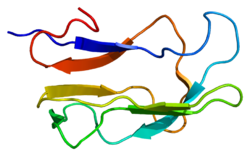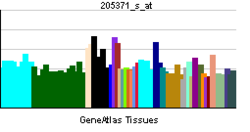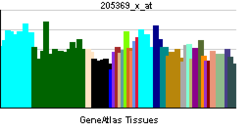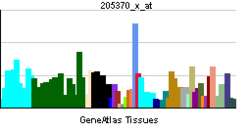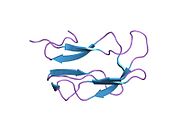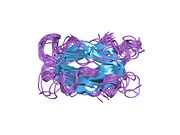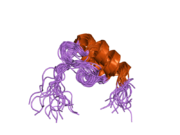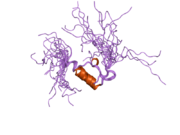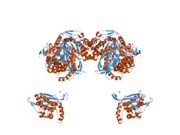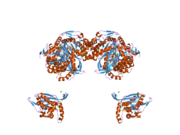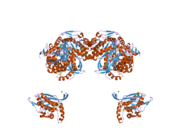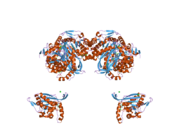- DBT (gene)
-
Lipoamide acyltransferase component of branched-chain alpha-keto acid dehydrogenase complex, mitochondrial is an enzyme that in humans is encoded by the DBT gene.[1][2][3]
The branched-chain alpha-keto acid dehydrogenase complex (BCKD) is an inner-mitochondrial enzyme complex involved in the breakdown of the branched-chain amino acids isoleucine, leucine, and valine. The BCKD complex is thought to be composed of a core of 24 transacylase (E2) subunits, and associated decarboxylase (E1), dehydrogenase (E3), and regulatory subunits. This gene encodes the transacylase (E2) subunit. Mutations in this gene result in maple syrup urine disease, type 2. Alternatively spliced transcript variants have been described, but their biological validity has not been determined.[3]
References
- ^ Lau KS, Chuang JL, Herring WJ, Danner DJ, Cox RP, Chuang DT (Dec 1992). "The complete cDNA sequence for dihydrolipoyl transacylase (E2) of human branched-chain alpha-keto acid dehydrogenase complex". Biochim Biophys Acta 1132 (3): 319–21. PMID 1420314.
- ^ Lau KS, Herring WJ, Chuang JL, McKean M, Danner DJ, Cox RP, Chuang DT (Dec 1992). "Structure of the gene encoding dihydrolipoyl transacylase (E2) component of human branched chain alpha-keto acid dehydrogenase complex and characterization of an E2 pseudogene". J Biol Chem 267 (33): 24090–6. PMID 1429740.
- ^ a b "Entrez Gene: DBT dihydrolipoamide branched chain transacylase E2". http://www.ncbi.nlm.nih.gov/sites/entrez?Db=gene&Cmd=ShowDetailView&TermToSearch=1629.
Further reading
- Patel MS, Harris RA (1995). "Mammalian alpha-keto acid dehydrogenase complexes: gene regulation and genetic defects". FASEB J. 9 (12): 1164–72. PMID 7672509.
- Popov KM, Zhao Y, Shimomura Y et al. (1992). "Branched-chain alpha-ketoacid dehydrogenase kinase. Molecular cloning, expression, and sequence similarity with histidine protein kinases". J. Biol. Chem. 267 (19): 13127–30. PMID 1377677.
- Fisher CW, Lau KS, Fisher CR et al. (1991). "A 17-bp insertion and a Phe215----Cys missense mutation in the dihydrolipoyl transacylase (E2) mRNA from a thiamine-responsive maple syrup urine disease patient WG-34". Biochem. Biophys. Res. Commun. 174 (2): 804–9. doi:10.1016/0006-291X(91)91489-Y. PMID 1847055.
- Zneimer SM, Lau KS, Eddy RL et al. (1991). "Regional assignment of two genes of the human branched-chain alpha-keto acid dehydrogenase complex: the E1 beta gene (BCKDHB) to chromosome 6p21-22 and the E2 gene (DBT) to chromosome 1p31". Genomics 10 (3): 740–7. doi:10.1016/0888-7543(91)90458-Q. PMID 1889817.
- Chuang DT, Fisher CW, Lau KS et al. (1991). "Maple syrup urine disease: domain structure, mutations and exon skipping in the dihydrolipoyl transacylase (E2) component of the branched-chain alpha-keto acid dehydrogenase complex". Mol. Biol. Med. 8 (1): 49–63. PMID 1943690.
- Herring WJ, Litwer S, Weber JL, Danner DJ (1991). "Molecular genetic basis of maple syrup urine disease in a family with two defective alleles for branched chain acyltransferase and localization of the gene to human chromosome 1". Am. J. Hum. Genet. 48 (2): 342–50. PMC 1683011. PMID 1990841. http://www.pubmedcentral.nih.gov/articlerender.fcgi?tool=pmcentrez&artid=1683011.
- Lau KS, Lee J, Fisher CW et al. (1991). "Premature termination of transcription and alternative splicing in the human transacylase (E2) gene of the branched-chain alpha-ketoacid dehydrogenase complex". FEBS Lett. 279 (2): 229–32. doi:10.1016/0014-5793(91)80155-V. PMID 2001734.
- Mitsubuchi H, Nobukuni Y, Akaboshi I et al. (1991). "Maple syrup urine disease caused by a partial deletion in the inner E2 core domain of the branched chain alpha-keto acid dehydrogenase complex due to aberrant splicing. A single base deletion at a 5'-splice donor site of an intron of the E2 gene disrupts the consensus sequence in this region". J. Clin. Invest. 87 (4): 1207–11. doi:10.1172/JCI115120. PMC 295137. PMID 2010537. http://www.pubmedcentral.nih.gov/articlerender.fcgi?tool=pmcentrez&artid=295137.
- Danner DJ, Litwer S, Herring WJ, Pruckler J (1989). "Construction and nucleotide sequence of a cDNA encoding the full-length preprotein for human branched chain acyltransferase". J. Biol. Chem. 264 (13): 7742–6. PMID 2708389.
- Nobukuni Y, Mitsubuchi H, Endo F, Matsuda I (1989). "Complete primary structure of the transacylase (E2b) subunit of the human branched chain alpha-keto acid dehydrogenase complex". Biochem. Biophys. Res. Commun. 161 (3): 1035–41. doi:10.1016/0006-291X(89)91347-8. PMID 2742576.
- Lau KS, Griffin TA, Hu CW, Chuang DT (1988). "Conservation of primary structure in the lipoyl-bearing and dihydrolipoyl dehydrogenase binding domains of mammalian branched-chain alpha-keto acid dehydrogenase complex: molecular cloning of human and bovine transacylase (E2) cDNAs". Biochemistry 27 (6): 1972–81. doi:10.1021/bi00406a025. PMID 2837277.
- Litwer S, Danner DJ (1985). "Identification of a cDNA clone in lambda gt11 for the transacylase component of branched chain ketoacid dehydrogenase". Biochem. Biophys. Res. Commun. 131 (2): 961–7. doi:10.1016/0006-291X(85)91333-6. PMID 2932110.
- Litwer S, Danner DJ (1988). "Mitochondrial import and processing of an in vitro synthesized human prebranched chain acyltransferase fragment". Am. J. Hum. Genet. 43 (5): 764–9. PMC 1715554. PMID 3189339. http://www.pubmedcentral.nih.gov/articlerender.fcgi?tool=pmcentrez&artid=1715554.
- Hummel KB, Litwer S, Bradford AP et al. (1988). "Nucleotide sequence of a cDNA for branched chain acyltransferase with analysis of the deduced protein structure". J. Biol. Chem. 263 (13): 6165–8. PMID 3245861.
- Chuang DT, Niu WL, Cox RP (1982). "Activities of branched-chain 2-oxo acid dehydrogenase and its components in skin fibroblasts from normal and classical-maple-syrup-urine-disease subjects". Biochem. J. 200 (1): 59–67. PMC 1163502. PMID 6895847. http://www.pubmedcentral.nih.gov/articlerender.fcgi?tool=pmcentrez&artid=1163502.
- Wynn RM, Kochi H, Cox RP, Chuang DT (1994). "Differential processing of human and rat E1 alpha precursors of the branched-chain alpha-keto acid dehydrogenase complex caused by an N-terminal proline in the rat sequence". Biochim. Biophys. Acta 1201 (1): 125–8. doi:10.1016/0304-4165(94)90161-9. PMID 7918575.
- Fisher CW, Fisher CR, Chuang JL et al. (1993). "Occurrence of a 2-bp (AT) deletion allele and a nonsense (G-to-T) mutant allele at the E2 (DBT) locus of six patients with maple syrup urine disease: multiple-exon skipping as a secondary effect of the mutations". Am. J. Hum. Genet. 52 (2): 414–24. PMC 1682180. PMID 8430702. http://www.pubmedcentral.nih.gov/articlerender.fcgi?tool=pmcentrez&artid=1682180.
PDB gallery 1k8m: Solution Structure of the Lipoic Acid-Bearing Domain of the E2 component of Human, Mitochondrial Branched-Chain alpha-Ketoacid Dehydrogenase1k8o: Solution Structure of the Lipoic Acid-Bearing Domain of the E2 component of Human, Mitochondrial Branched-Chain alpha-Ketoacid Dehydrogenase1zwv: Solution Structure of the subunit binding domain (hbSBD) of the human mitochondrial branched-chain alpha-ketoacid dehydrogenase2coo: Solution structure of the e3_binding domain of dihydrolipoamide branched chaintransacylase2ihw: Crystal structure of a cubic core of the dihydrolipoamide acyltransferase (E2b) component in the branched-chain alpha-ketoacid dehydrogenase complex (BCKDC), apo form2ii3: Crystal structure of a cubic core of the dihydrolipoamide acyltransferase (E2b) component in the branched-chain alpha-ketoacid dehydrogenase complex (BCKDC), Oxidized Coenzyme A-bound form2ii4: Crystal structure of a cubic core of the dihydrolipoamide acyltransferase (E2b) component in the branched-chain alpha-ketoacid dehydrogenase complex (BCKDC), Coenzyme A-bound form2ii5: Crystal structure of a cubic core of the dihydrolipoamide acyltransferase (E2b) component in the branched-chain alpha-ketoacid dehydrogenase complex (BCKDC), Isobutyryl-Coenzyme A-bound formAldehyde/oxo oxidoreductases (EC 1.2) 1.2.1: NAD or NADP 1.2.2: cytochrome 1.2.3: oxygen 1.2.4: disulfide 1.2.7: iron-sulfur protein B enzm: 1.1/2/3/4/5/6/7/8/10/11/13/14/15-18, 2.1/2/3/4/5/6/7/8, 2.7.10, 2.7.11-12, 3.1/2/3/4/5/6/7, 3.1.3.48, 3.4.21/22/23/24, 4.1/2/3/4/5/6, 5.1/2/3/4/99, 6.1-3/4/5-6 Photosynthesis Dehydrogenase Other CAD (Carbamoyl phosphate synthase II, Aspartate carbamoyltransferase, Dihydroorotase) · Cholesterol side-chain cleavage enzyme · Cytochrome b6f complex · Electron transport chain · Fatty acid synthetase complex · Glycine decarboxylase complex · Mitochondrial trifunctional protein (HADHA, HADHB) · Phosphoenolpyruvate sugar phosphotransferase system · Polyketide synthase · Sucrase-isomaltase complex · Tryptophan synthaseCategories:- Human proteins
- Chromosome 1 gene stubs
Wikimedia Foundation. 2010.

